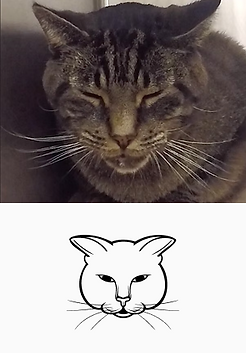HOW TO USE
Using the Feline Grimace Scale
-
Download the App
-
Observe the cat undisturbed for 30 seconds. If the cat is grooming, eating or vocalising, wait before scoring. If a cat is sleeping, leave it undisturbed and wait until they are awake.
-
Each action unit is individually evaluated and scored as '0' (action unit is absent), '1' (action unit is moderately present or there is uncertainty over its presence) or '2' (action unit is obviously present).
-
See below examples of each action unit scored as '0', '1' or '2'.

No Pain or Mild Pain
0 = Action unit is absent
-
Ears facing forward
-
Eyes opened
-
Muzzle relaxed (round shape)
-
Whiskers loose and curved
-
Head above the shoulder line

Mild to moderate pain
1 = Action unit is moderately present or there is uncertainty over its presence
-
Ears slightly pulled apart
-
Eyes partially opened
-
Muzzle mildly tense
-
Whiskers slightly curved or straight
-
Head aligned with the shoulder line

Moderate to severe pain
2 = Action unit is markedly present
-
Ears flattened and rotated outwards
-
Squinted eyes
-
Muzzle tense (elliptical shape)
-
Whiskers straight and moving forward
-
Head below the shoulder line or tilted down
Interpreting the Scores
The FGS© has 5 action units that can be scored from 0 to 2. Thus, the maximum possible score is 10. A "cut-off" value (score ≥ 4) suggests that the veterinarian should consider the administration of pain killers, taking into consideration the physical status of the patient and other drugs previously administered. When scores of 4 are obtained and the veterinarian is uncertain whether more analgesics should be administered, the cat should be re-evaluated in 10-15 minutes. If you are a cat owner and scores are ≥ 4, you should contact your veterinarian. Please do not give any painkillers to your cat without your veterinarian's guidance.





